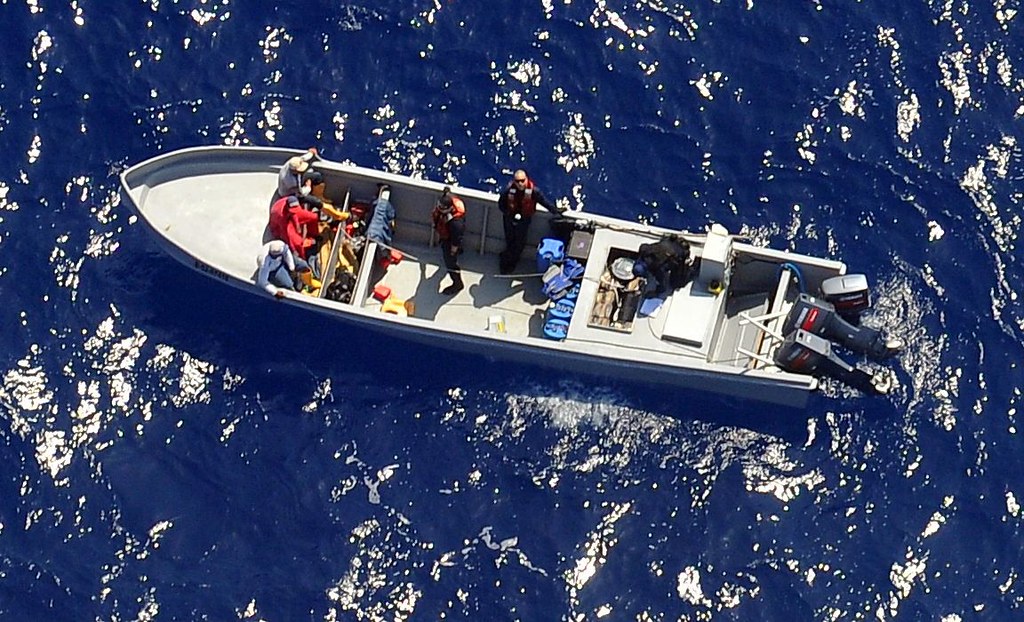Key Takeaways:
- A retired general says the drug boat strike may have broken the law.
- Officials gave mixed stories about the boat’s destination.
- Experts warn it looks like an extrajudicial killing.
- The boat’s size raises questions of human trafficking.
The recent drug boat strike off Venezuela has stirred fierce debate. A top military analyst slammed President Trump’s decision. He argued the strike may have been illegal. Moreover, he warned it felt like an extrajudicial killing.
What Happened With the Drug Boat Strike?
In late July, U.S. forces bombed a vessel they believed ran drugs. Officials said it carried millions of dollars in cocaine. Furthermore, they claimed it headed toward America. However, soon after, the story changed.
Lieutenant General Mark Hertling, who led troops in Afghanistan, spoke out. He joined The Bulwark’s podcast and called the action questionable. He noted the operation seemed to lack proper legal backing. In simple terms, he saw it as “overkill.”
Why Experts Call It Extrajudicial
Many former soldiers and lawyers ask: was this strike legal? In standard practice, the U.S. needs clear authorization to use force. Otherwise, attacks resemble extrajudicial killings. First, such killings bypass courts and trials. Next, they ignore due process.
General Hertling explained that rules in war zones differ. Yet, off a foreign coast, law still applies. He said this drug boat strike felt like an unchecked attack. Moreover, it mirrored tactics used in Iraq and Afghanistan without proper oversight. Therefore, war powers and international law could have been breached.
Mixed Messages From the White House
Adding to the confusion, White House officials could not keep their story straight. Initially, the Secretary of State said the boat was bound for Trinidad. Then, President Trump asserted it moved toward American shores. Finally, the secretary updated his claim to match the president.
Such back-and-forth leads to distrust. Analysts wonder which account, if any, was accurate. As a result, the public finds it hard to know the real threat. Consequently, critics say shifting explanations weaken the case for the strike.
Could Human Traffickers Be Involved?
The vessel’s size puzzled some experts. It was small for a major drug shipment. Instead, it resembled boats used by human traffickers. General Hertling noted this possibility. He asked if trafficked people were on board.
If that were true, the strike would raise even graver issues. For example, attacking a boat with refugees could violate human rights laws. Also, families might have suffered casualties. Thus, the decision would require extra caution and verification.
Was the drug boat strike only about drugs, or did it involve people? That question has no clear answer yet. Nevertheless, it underscores the need for detailed intelligence before such actions.
What This Means for International Law
International rules govern when and how nations can use force. In broad terms, a state may strike in self-defense or with United Nations approval. However, the U.S. did not claim self-defense here. Nor did it cite a UN mandate.
Therefore, critics say the drug boat strike risks setting a dangerous precedent. If one country can bomb a vessel without solid proof, other nations might follow. This could lead to more extrajudicial attacks on the high seas. Ultimately, it could undermine global order.
Moreover, when laws seem optional, less stable countries might ignore them entirely. In turn, that could fuel conflicts and weaken alliances.
Reactions and Next Steps
After the strike, the U.S. military recovered some drugs and debris. Yet, it reported no drug cash or captives. Meanwhile, Venezuelan officials condemned the attack as an act of aggression. They called it a violation of their sovereignty.
Human rights groups also weighed in. They urged a full investigation. They want to see evidence justifying such a forceful response. Until then, they say, doubts will linger.
In Congress, some lawmakers question whether the president overstepped his authority. They demand briefings on the intelligence behind the mission. Others defend Trump, arguing the U.S. must strike drug routes aggressively.
Ultimately, the outcome depends on new facts. If clear proof emerges that the boat posed an imminent threat to America, critics may soften. However, if evidence remains murky, the strike could haunt U.S. policy for years.
Key Lessons
First, transparency matters. Clear and consistent stories build trust. Second, following legal rules protects both service members and civilians. Third, rushing to action without full facts can backfire. In this case, the drug boat strike showcases all three lessons.
Moreover, when national leaders act, they must weigh immediate gains against long-term risks. Here, the threat of drugs or trafficked people clashed with legal and ethical obligations.
In the final analysis, the true impact of the drug boat strike remains unclear. Yet, the debate it sparked shows why law and oversight matter in modern warfare.
Frequently Asked Questions
What did Lt. Gen. Hertling say about the strike?
He said the attack looked like an extrajudicial killing. He questioned whether it met U.S. or international law.
Why is consistency in official statements important?
Clear and steady messages help the public trust decisions. Mixed stories raise doubts about the true motive.
Could people have been on the boat?
Yes. Its size suggests it might have carried trafficked individuals. That possibility adds more legal and moral concerns.
What are the next steps in this case?
Congress may demand briefings. Human rights groups want a full investigation. The White House could release more evidence.
